I need you to put your Laura Ingalls bonnet on now because you're going to learn how to make old fashioned fermented dill pickles in a crock.
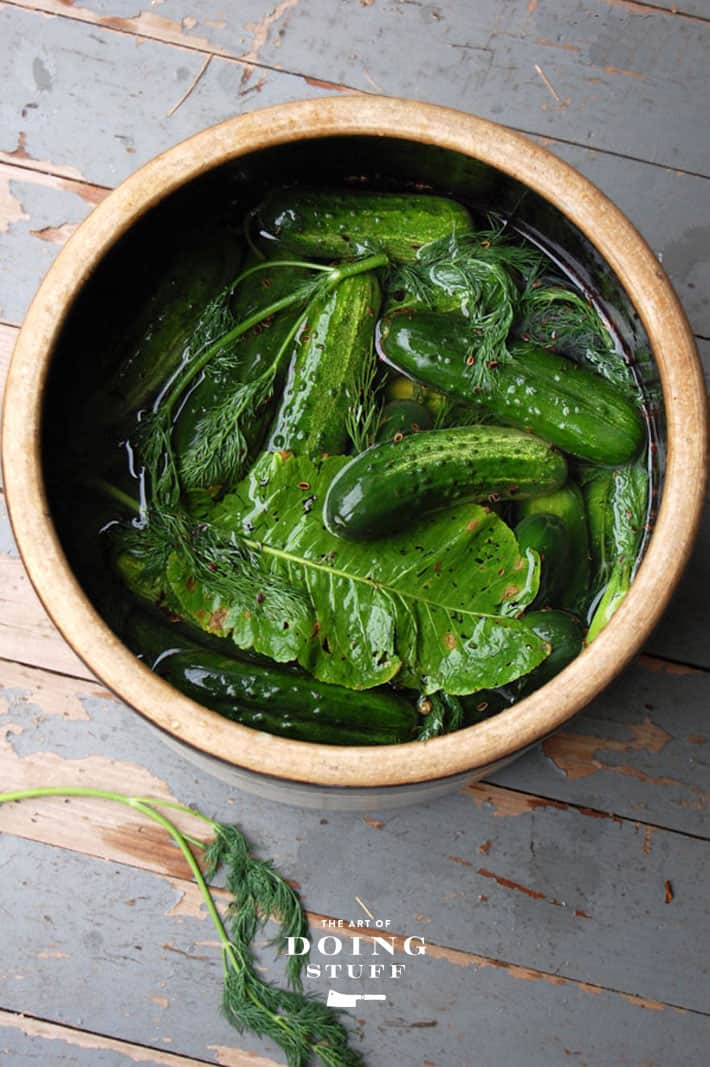
Only a person of very suspicious character would want to eat just one pickle. The same kind of person who only eats one cookie. Or one potato chip. Or who walks around their house laughing diabolically for no reason while wearing kittens as slippers. And if those pickles are fermented pickles? Well then that person is just plain demented.
Kosher dills. Sighhhhhhh.
Regular dill pickles are O.K., but I was raised on Kosher dills and to me that's what a dill pickle should taste like.
Table of Contents
What's a Kosher Dill?
- Kosher dills are fermented pickles that are made sour or half-sour naturally. They aren't necessarily kosher in the Jewish dietary sense. They're named Kosher Dills because they're the style of pickle that you would get at a good Jewish deli.
- Vinegar is what's normally used to get the sour flavour in regular dill pickles, but kosher pickles are fermented in just water with some seasonings. You combine salt, dill, water and pickling cucumbers in a crock and let them sit at room temperature for a few weeks. Some people add garlic.
- Homemade kosher dills that haven't been processed are FULL of probiotics. Once you process them though, you lose those probiotics so consider that when you're deciding whether to process them or not.
I tried fermenting pickles when I first moved into my house about 15 years ago and I can tell you I have never been so excited to rot something. O.K., fermenting isn't really rotting something, but it sounds more fun. More daring. Less hippie, more badass.
I have no idea where I got my original fermenting pickles recipe but I'm pretty sure it must have been off of a salt box, because after waiting patiently for 5 weeks for my pickles to ferment, what I ended up with were soft squishes of pickle made up of 1% cucumber and 99% salt. They were the dead sea pickles.
I now know how to fix pickles that are too salty (you can read about how to do that here) but at the time all I could do was throw the salty mushballs out.
I now make my pickles according to the directions from Sandor Katz in his book called Wild Fermentation: A Do-It-Yourself Guide to Cultural Manipulation (DIY). It's the book I used to create my own yeast for sourdough starter. Since it is dedicated to all things fermented and the sourdough starter worked out, I figured the fine folks who wrote it would have a pretty good handle on the fermented Kosher dill. Plus the author's last name is Katz.
And I was right. These are GREAT pickles.
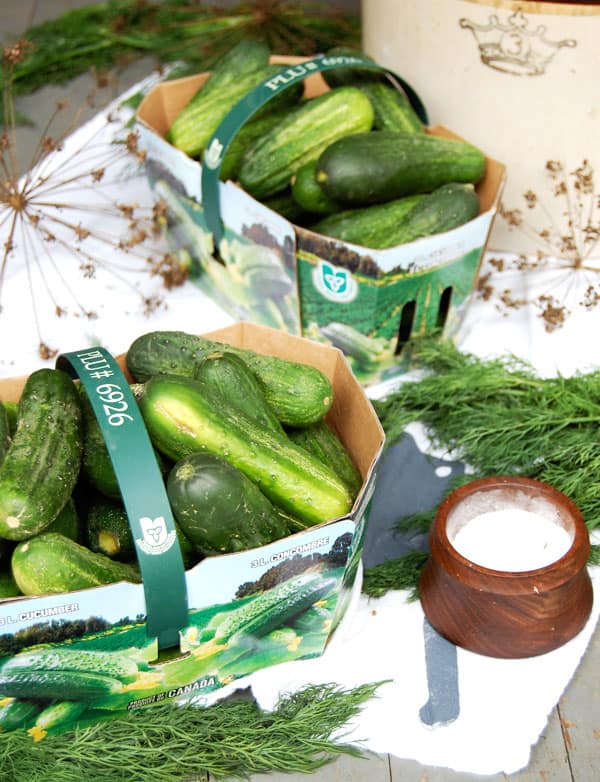
If you don't grow your own pickling cucumbers make sure the cucumbers you're buying from the market or grocery store are specifically "pickling cucumbers".
What the hell is a pickling cucumber?
Pickling cucumbers are shorter and fatter than regular cucumbers. Plus they're bred to be more firm which helps give a nice crunch to your pickles.
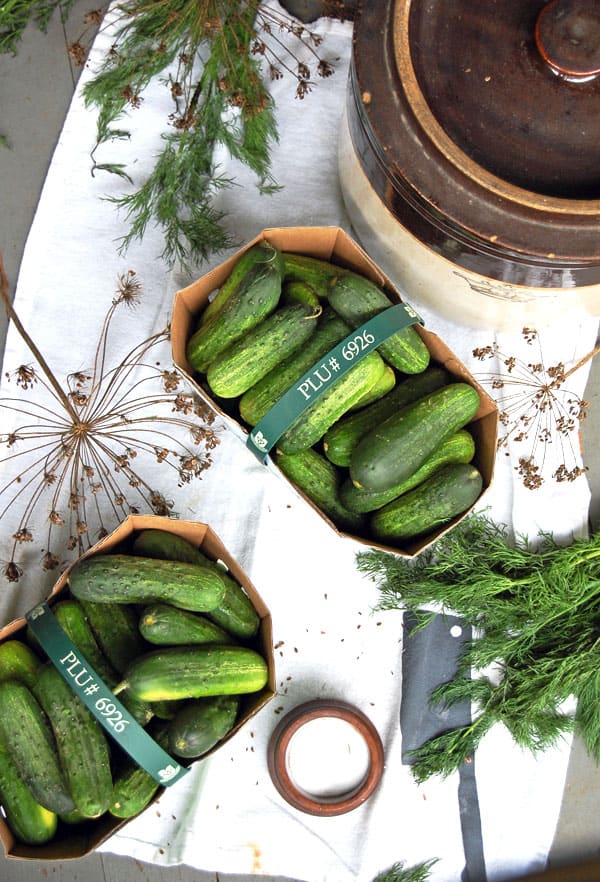
THE DILL
For your dill flavour in these pickles you can use any type of dill you can get your hands on. Fresh dill, dill seeds, dill heads, dried dill (as a last resort). But chances are if you can get your hands on pickling cucumbers, you can also get your hands on fresh dill or dried dill seeds.
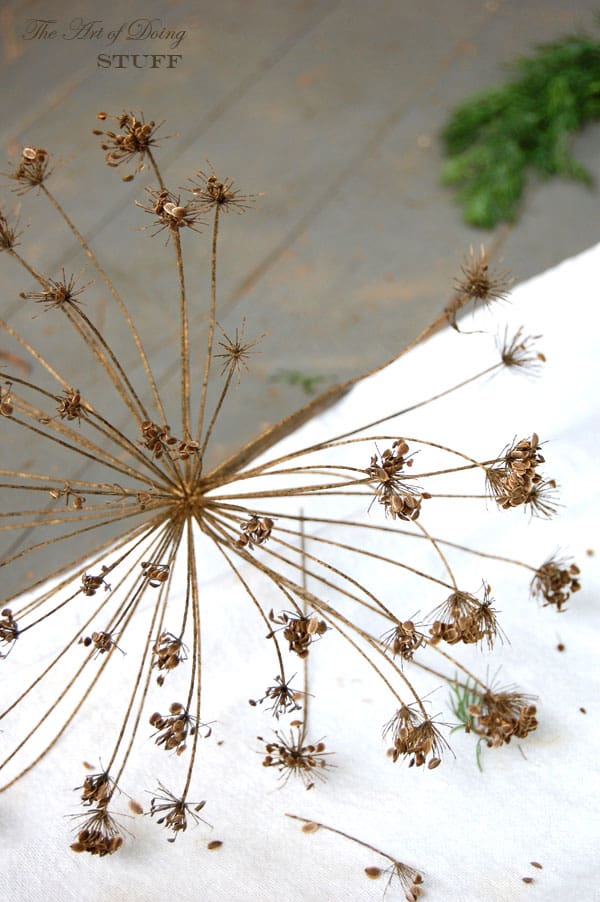
The book. If you're gonna buy a book about making kosher dills, you wanna go with someone with a last name like Katz. Or Steinberg. Or Greenbaum. Or anything that sounds like they'd have a good grasp on challah, latkes or brisket. Jews make the best pickles. It's not cultural stereotyping if it's the truth and something to be jealous of.
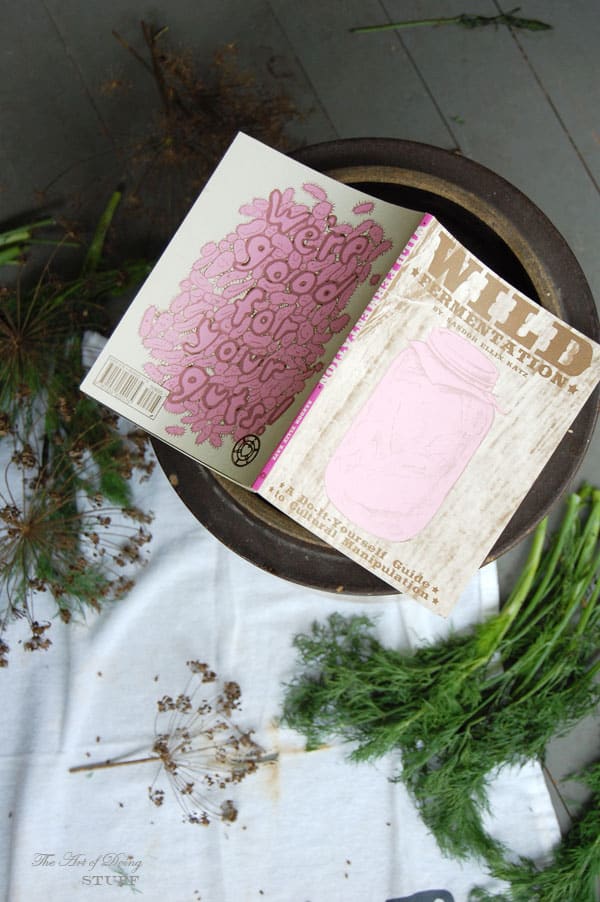
But mushy, ucky, icky! Homemade pickles are always soft and gross.
Yeah. Sometimes. But there are some workarounds that'll help keep your pickles crisp.
How to get crunchy pickles
- Soak them in ice cold water for a few of hours before processing them.
- Add a handful of leaves that have tannins to the brine: Grape leaves, Oak leaves or horseradish leaves are all good choices and high in tannins.*
- Cut the *blossom* end off of the pickle. The blossom end (it will be the more narrow end) contains an enzyme that causes pickles to soften when they ferment.
- Add calcium chloride to your brine. Ball's Pickle Crisp and Mrs. Wages are commercial calcium chloride product made for pickles.
- Low temperature pasteurization (video below) is a processing method that uses low temperatures for a longer period. This method helps keep your pickles as crunchy as possible.
*If you cut the blossom end off of your pickles there's no need to add tannins to the brine.
There are a lot of really beautiful, contemporary crocks for sale right now with the popularity of fermentation, but I like the classic, old fashioned looking crock for doing pickles.
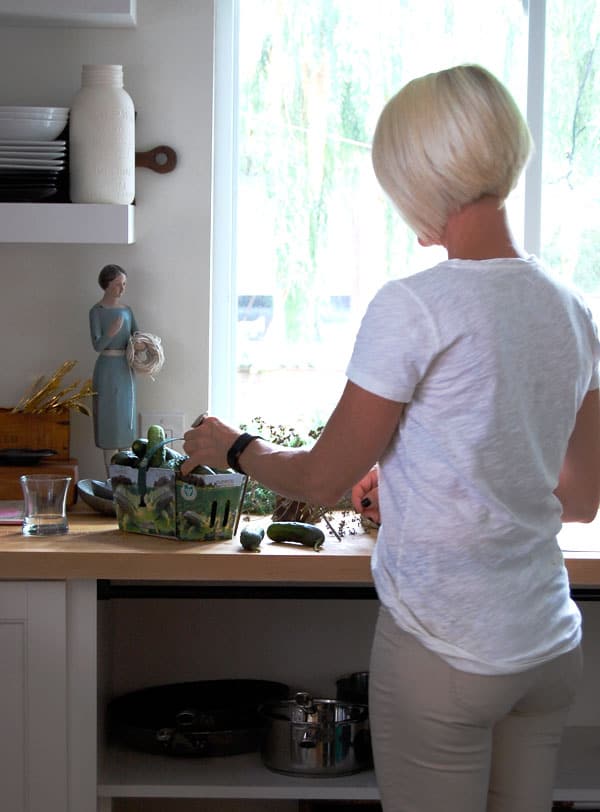
This is all there is in terms of seasoning. Salt and dill. Optional things to add are peppercorns and garlic.
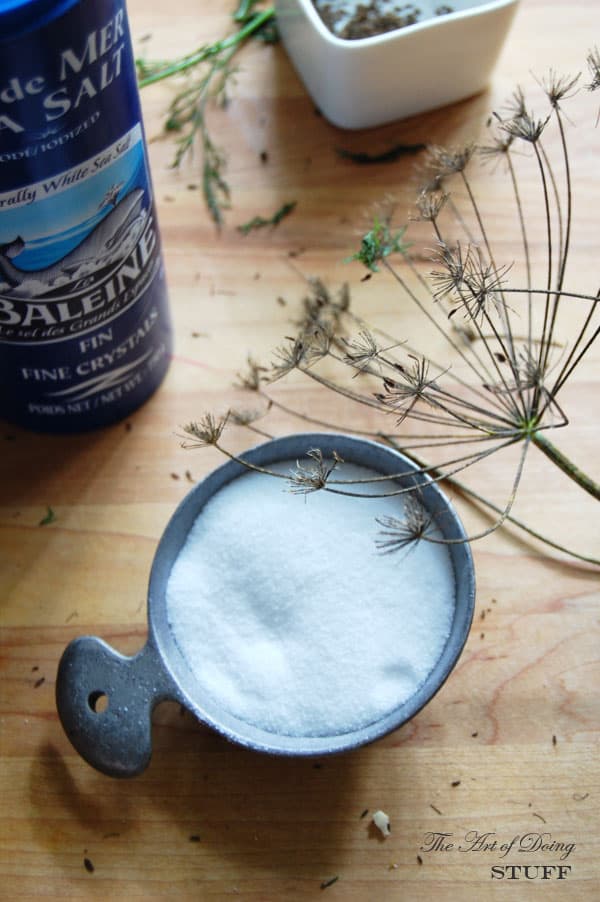
Would you like to save this stuff?
Layer everything in your crock.
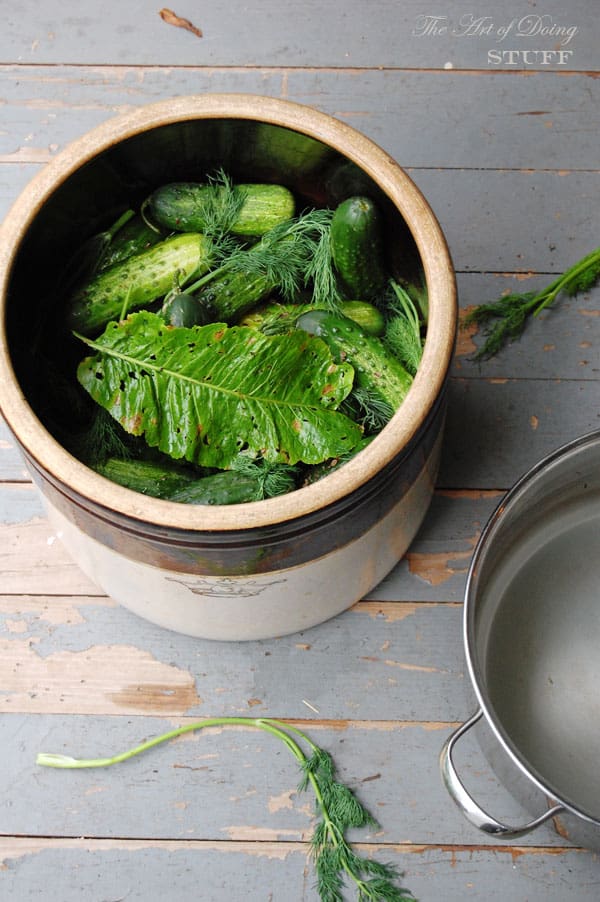
That's a horseradish leaf on top. Cover the pickles with water that has the salt dissolved in it.
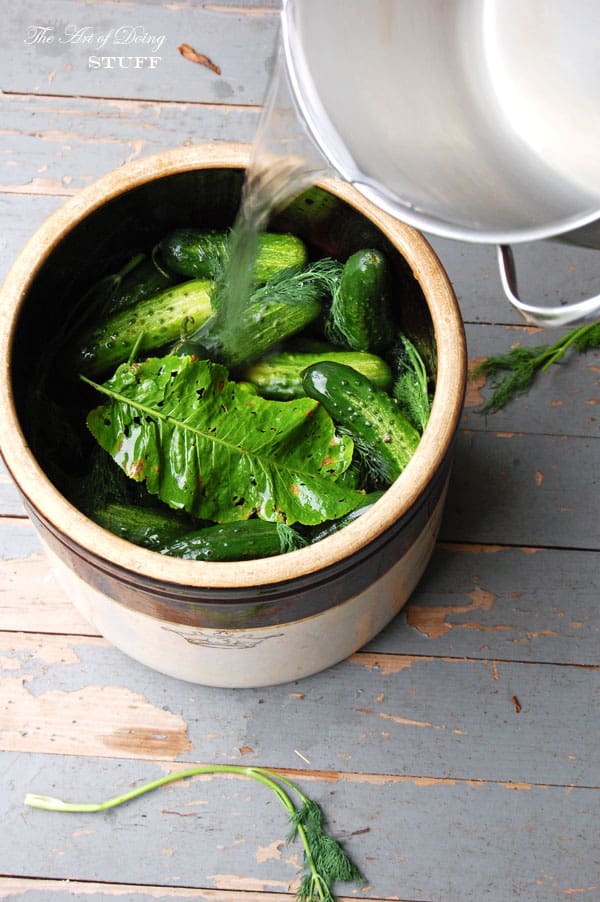
Admire the beauty that is the fledgling kosher dill.
Make sure all of the cucumbers are beneath the surface of the brine by weighing them down with something. I just used a few sandwich plates stacked on top of each other but you can buy pickle weights for crocks on Amazon.
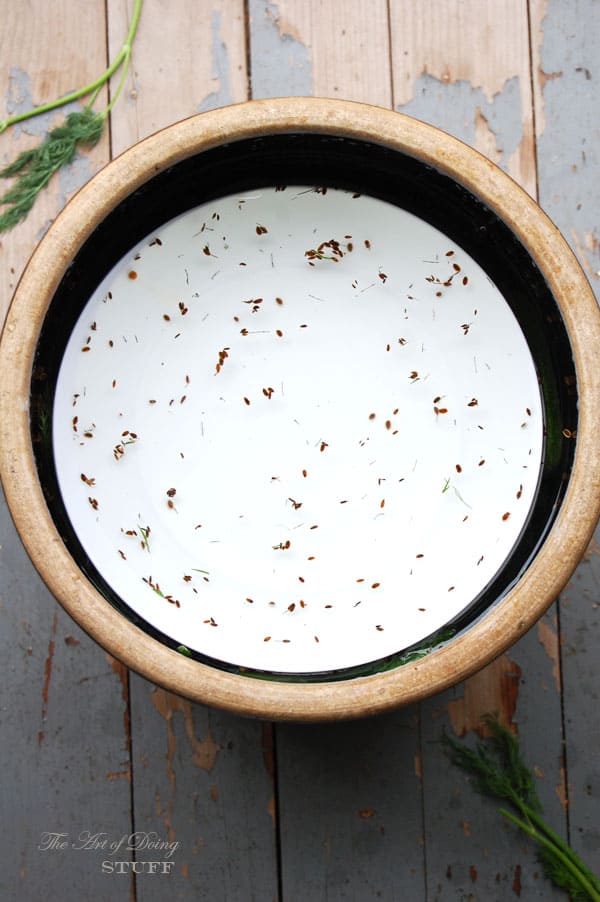
Then you wait. After just one day my pickles were starting to ferment. You can see the bubbles.
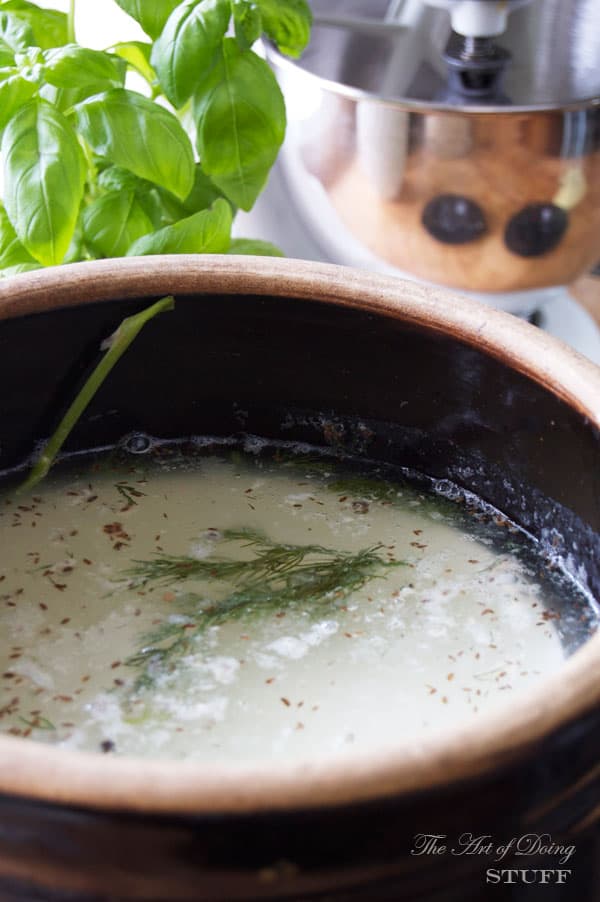
After 3-4 weeks (depending on the temperature in your house) your pickles will be fully fermented. To test them pick 1 pickle and cut a slice off of it every few days to taste, starting after a couple of weeks.
The pickles are ready when they taste good and are translucent throughout.
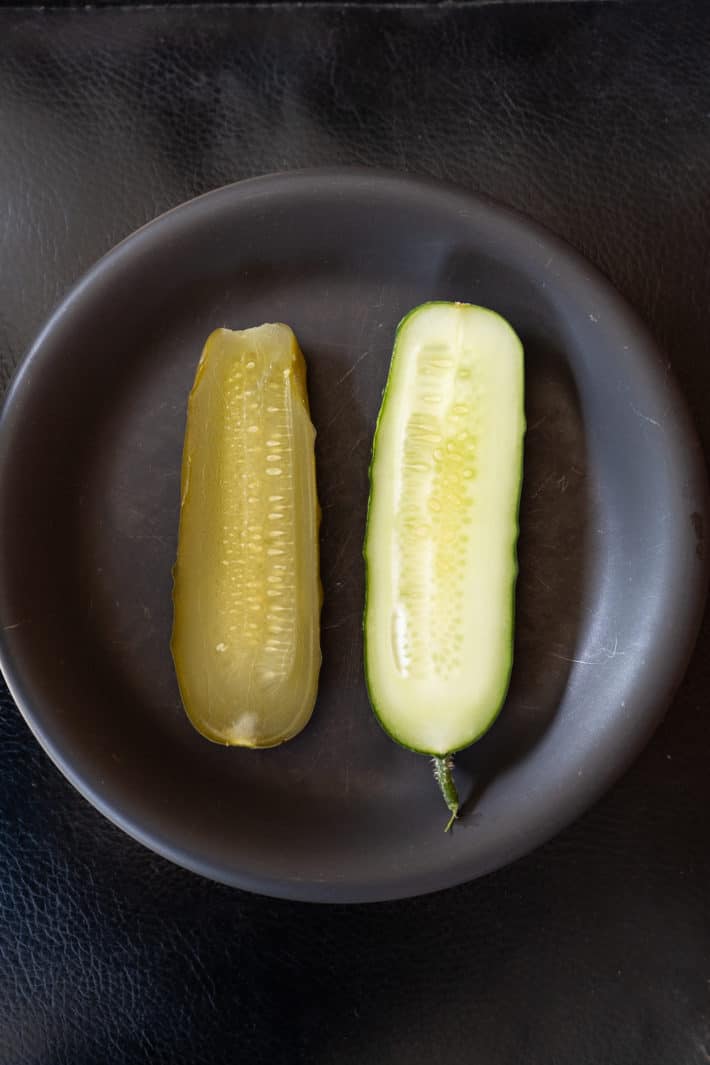
You can see how clear the fully fermented pickle on the left is compared to a fresh cucumber on the right.
After reading Wild Fermentation I've figured out that what I made years ago must have been "full sour" pickles. That means they have a lot more salt in the recipe which makes them last longer. This type of recipe would have been popular back in the olden days when refrigerators weren't around to keep pickles from going bad. So they used salt to preserve them.
Speaking of preserving them, fermented pickles will last for months and months in the fridge. If I'm being honest I don't even refrigerate them but I don't recommend you do that because I don't want you to get sick and die. And then sue me.
One way to be 100% sure about your fermented dills lasting a long time on the shelf is to process them, but processing pickles involves boiling them in a water bath for 10 - 15 minutes (depending on the size of the jar) which will reduce them to mush no matter how many blossom ends you cut off or leaves you added.
You have another option though. It's that low temperature pasteurization I mentioned earlier.
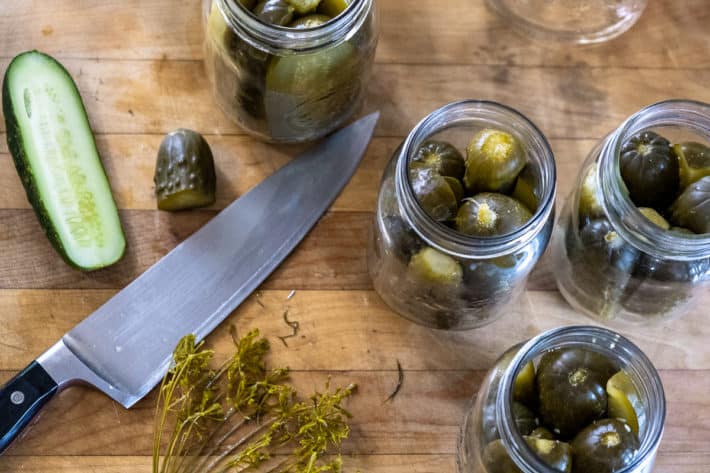
Low Temperature Pasteurization
This will help your pickles stay crispy even after processing. Because you're processing for a longer time at a lower temperature they better retain their crunch.
You simply add ¼ cup of vinegar to every 8 cups of water for your original brine mixture then follow these instructions.
- Fill a canning pot with water and heat it to between 180 F and 185 F.*
- Bring the pickle brine to a boil and let boil for 5 minutes.
- Pour brine into hot jars to within ½" from the top of the jar.
- Wipe the top of the jar so it's dry and clean.
- Add a sealer and ring to the jar.
- Process the pickles for 30 minutes in the low temperature water bath.
*the temperature MUST remain within this range. I find using a a Sous Vide stick is the easiest way to accomplish this without any stress.
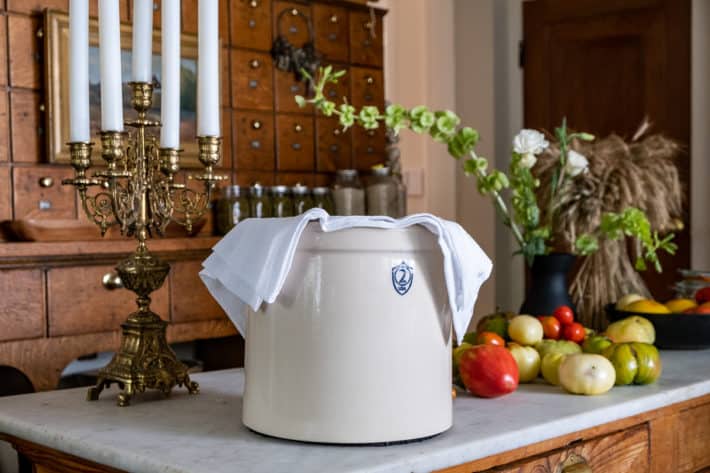
The recipe I used from Wild Fermentation is for a a Half-Sour which calls for a brine that is around 5% salt, as opposed to the full sour which would call for around 10% salt or even more.
Mazel Tov!
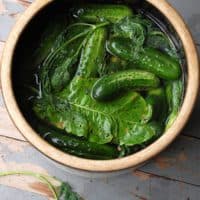
Kosher Dill Pickles
Ingredients
- 8 pounds cucumbers small to medium size
- 9 tablespoons sea salt* More if canning
- 9 dill heads fresh
- 1 handful fresh grape cherry, oak, and/or
- horseradish leaves if available
- 1 pinch black peppercorns
- 16 cups water
- 1 head garlic cloves skinned and separated
If you want to process/can add these ingredients to the brine:
- 1 cup pickling salt This will replace the 9 Tbsps.
- ½ cup vinegar
Instructions
- Bring salt and water to a boil, stirring to dissolve the salt. Let cool.
- Wash your cucumbers and cut off the "blossom" end. You just need to remove the blossom part.*
- Layer your cucumbers, dill and horseradish (or grape leaves) in the crock and cover with cooled salt water.
- Place a plate with a rock (or something else heavy) on top of the pickles to make sure they're completely submerged.
- Test pickles after a couple of weeks.
- Cucumbers will be translucent throughout when they're done.
- Place pickles in hot pint jars with enough brine to cover them and store in the fridge for several months.
Low Heat Processing
- Fill a canning pot with water and warm it to between 180 F - 185 F.
- Remove pickles from the brine and stuff them tightly into pint jars.
- Pour brine into a pot and heat until it comes to a boil. Boil for 5 minutes.
- Pour hot brine into the jars of pickles to ½" from the rim.
- Wipe the rim of the jars to make sure they're perfectly clean and put on a sealer and rim. Finger tighten only.
- Place your jars of pickles into the warm water bath and process for 30 minutes making sure the water doesn't fall below 180 F or go above 185 F.
Notes
- You must add more salt (than the original recipe) and vinegar to aid in the preservation process.
- Pickles get softer over time so for maximum crunch eat them within 6 months.
- The blossom end portion of the cucumber is said to make the pickles soft, so get rid of it. I've done my own experiments with this and it seems to be true.
Nutrition
→Follow me on Instagram where I often make a fool of myself←
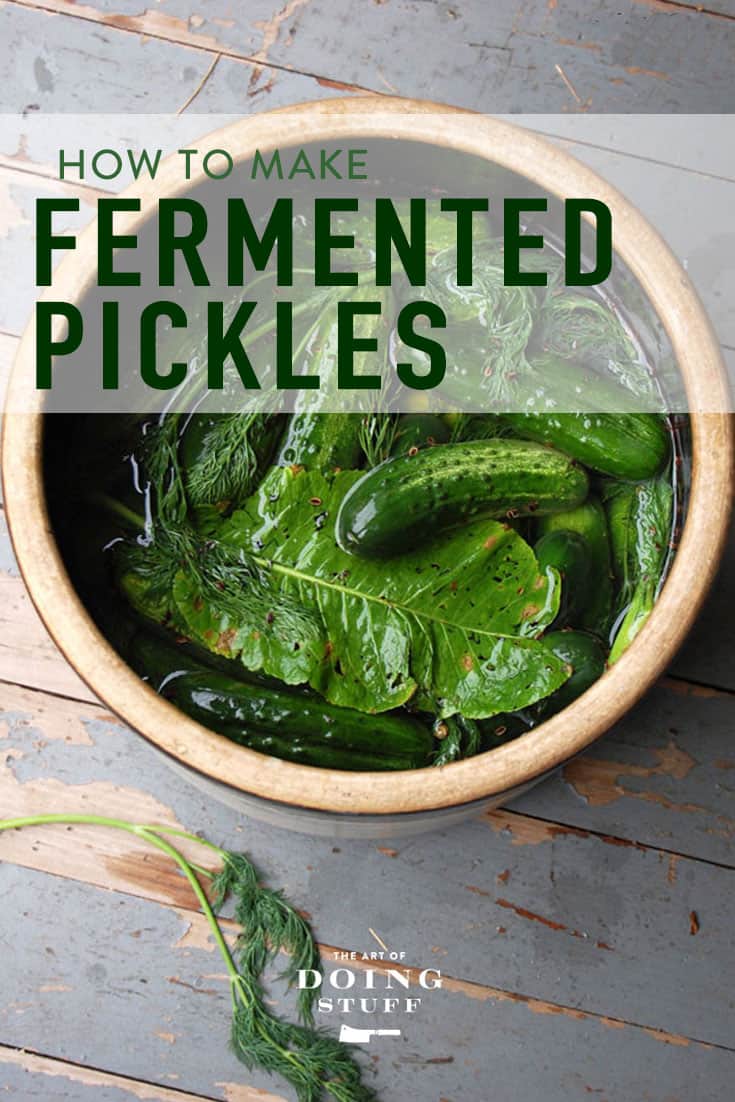

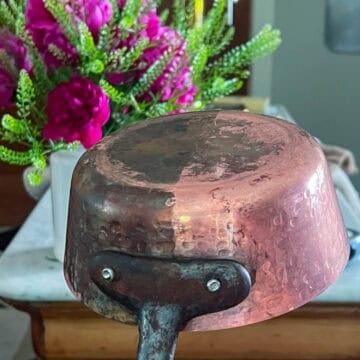

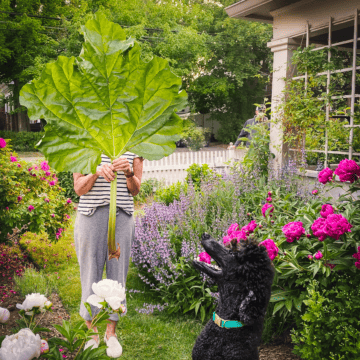
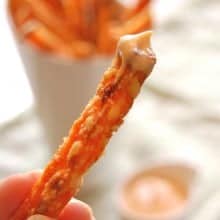
Pamela
As I’m not a gigantic fan of pickles I’m going to slip on my kittens and slide around on the tile floor in the hall.
I’ve vowed to not take up any more hobbies until we move in about a year so I’m waiting to install the electric fence around the front door of the new place. Bah humbug! If anyone wants to visit they can clear it with this old grouchy witch in advance. This happens once you’re over 60. You just are over “entertaining” unless you’ve got live in help to clean up the mess.
If you have kimchee recipes, that’s the fermented “pickle” I love. It’s yummy with almost everything and adds a kick.
Karen, you look fabulous, you’re witty, smart, can fix everything and you probably still are in your entertaining years. Quite a catch if you ask me.
Steve Rahn
I grew up in Northern New Jersey. My German-roots family went to a Kosher Deli in the next town to get things the Grand Union or A&P didn't carry ('Westphalia Ham, for instance). My favorite part of that Deli was the actual barrel they had in front of the meat counter, filled to the brim with pickle brine and the best, largest, Kosher Dill Pickles. My efforts to grow pickling cucumbers and discover a recipe that really works is an effort to recapture the taste and mouth feel of those Deli pickles. Thanks for giving me a great candidate recipe. Watch this space. :-)
Karen
Good luck Steve! It took me a few tries to get them to the way I like them. So you might like a little more or little less salt. ~ karen!
Lesley
You can do this same method with snap peas, green beans, and brussel sprouts....it's fantastic!
Karen Purpero
Hi there, first of all I love the 2014 haircut 😊
I have 2 questions: (plus a bonus)
• What size crock did you do use for 4 pounds of cucumbers? (I need to buy one) I live in Ohio so hopefully I can find one easily! You see them often but not with the lids. I can still taste the pickles at Carnegie Deli in NYC!! Yum.
• Also, I’m starting my seeds right now, do you still recommend Kirbys?
•• If I can be so greedy asking you questions: I’m a sophomore gardener. What vegetables have you had the best success with “direct sowing”. I only have 4 heat mats and one light kit for seed starting indoors, so I’d like to direct sow as much as possible! And, I’m going to string up tomatoes this year!!!
I think you’re hilarious and I wish I could invite you over for dinner! We could have corned beef. 😎
Jody
I'm starting to think about fermenting and doing some reading. Some sources say to use distilled water as tap water with chlorine and fluoride shouldn;t be used.
Do you use tap water? What are your expert thoughts?
Jan in Waterdown
Yep I know I’m 2 years late to this party but I wouldn’t want to rush into these things ya know?
Yesterday, I got “Wild Fermentation” from the library (after just reading this post again) and noticed that the author has a recipe for brined capers but substituting small milkweed seed pods since we apparently don’t get a heckuva lot of Mediterranean caper bushes here. It seems like a nifty companion to raising monarchs and just wondering if you've tried it? That might make a cool post..... just sayin’ 😏
Pat Schmitt
How long can you leave your pickles soaked in the salt water before pickling them. I have had my in for 3 days, was called away, now I’m not sure if they are still good to use?
Joan
wearing kittens as slippers?
What in Hell is wrong with your mind that you'd use that kind of imagery? That sort of sickness is no joke and for you to even have that in your head, let alone thinking it's funny says a lot about you and none of it is good.
Karen
LOL, wow. I realize you think I'm the one who has issues, but I think you'd be better to look at your own life to see that everything's in order if you're truly offended by a post about pickles. I don't mean that harshly, I mean it sincerely. ~ karen!
Elissa Burda
OK so I make these pickles from that exact recipe and they are absolutely the best ever, ever, ever!!
And I grow horseradish so can affirm that the leaves help to keep the pickles crispy.
Pickle related: my husband is a direct import from Russia; but he grew up in central Asia, and I have learned over the past 40 years or so to do some central Asian cooking. Lots of pickles btw. AND FYI I make watermelon pickles, with the whole watermelon, not just the rind. And they are garlicky and dill-y and absolutely amazing. Sounds weird I know, but tastes superb! I will gladly share the recipe!
Karen
I have literally run out of room for pickles otherwise I'd try the watermelon ones this year ~ karen!
leo muzzin
one of my summer jobs while going to Mac was with Strub's in Dundas, so I got first hand experience processing kosher dills. Garlic and pickling spices were added as well as fresh dill. The pickles, brine, dill and spices were placed in oak barrels and put outside for about a week in the sun to ferment. The salt made eating these addictive!
Karen
One of the Strubs sons has started a pickle company where you can buy a kit and make your own fermented pickles. (for the people who prefer doing things with kits) ~ karen!
Jane
I know this is 3 years too late, but I only just read the comment. I'd love to know how Strub's makes their Sandwich Snackers! They're getting expensive these days.
Some 30 odd years ago, I tried my hand at making kosher dills. Bought a large crock and a small bean crock at a garage sale for next to nothing. Got a recipe off a cookbook from my husband's university housemate. Got the cucumbers from the farmer's market. Picked a few leaves off my own grapevine. After the pickles were ready, they didn't last a week. So good! Then life got in the way and lost the recipe.
The crocks are still in the attic though and the grapevine needs heavy pruning every year. Maybe it's time to revisit.
leo muzzin
Jane: When I was at Strub's (summer job circa 1966) they did not make "sandwich snackers" unless that is another name for dill pickels. My job during the day was to prepare about 30-40 whiskey barrel size barrels, by tightening the hoops, placing a cup of pickling spices, cup of crushed garlic and a bunch of fresh dill at the bottom. I crushed the garlic beforehand. I also prepared the brine by dumping a 50 lb bag of salt in a 200 gallon vat and adding water until full. By mid afternoon Leo Strub and I would drive out to the farms and pick up sacks of cukes. Back at the factory the cukes would be put through a washer and into the barrels. About half way through the barrel, and on top, spices, garlic and dill was added. The barrels were then sealed androlled outside and filled with the brine. I topped off the barrels each day . After about a week or so one of the elder Strubs did a taste test and determined if the ferment was OK. If so the barrels were put in their cooler until they were processed. Incidentally I was in NYC at Katz for a pastrami ( fantastic) sandwich a few years ago and their pickles tasted exactly as Strub's!! (same recipe??)
Jane
Thanks for the info, Leo! I'll try scaling things down and experiment. The summer I spent in NYC, the pickles and sandwiches from the Jewish deli near Columbia U were to die for! So were the ones from the cafeteria of Western Reserve when I was @ Case. Not as good as the Jewish deli though.
gary
Nice looking jeans. Going to try the pickles. I have tried before. They rotted :(
Liz
Thanks for this post Karen! My heritage is Hungarian and at least once a summer I make a traditional Hungarian fermented pickle recipe that loosely translated is called "water pickles" In case you are interested here is a link to a recipe that is identical to the one that I use except that I don't use the peppercorns. The recipe states that the pickles are ready in about 5 days but I find that they actually go a bit faster than that. I am going to try your recipe to make the Kosher dills and I love the idea of adding grape leaves or oak leaves to make sure that they stay crunchy (matter of fact I think that I'll try that with the water pickles too.)
Here's the link: http://www.timvidraeats.com/2012/07/hungarian-kovaszos-uborka-sour-pickles.html
Your recipe uses whole uncut Kirbys but the faster fermentation requires the cucumbers to have cuts in them so that the brine penetrates quicker. I cut the ends off the cucumbers and put my paring knife through the cucumber about 3/4" from the end and cut all the way through and down (the cucumber is only attached at the one end and loose at the other) Then I give it a 1/4 turn and cut through going opposite way. When you are ready to serve them they just need to be cut or torn that little bit.
Karen
Thanks Liz! I'll take a look. And good tip about the end cutting. ~ karen
Lianne
I decided to try this natural fermentation process this year and used the recipe you linked to. (5% brine)
The pickles it made are still way too salty for me - much saltier than the pickles we are all used to. All you taste is the salt. I guess I will stick with pickles with vinegar. Just a heads up for others - you have to like really, really salty pickles if you use this method.
Sauerkraut Billy
I love your pictures Karen! They do a great job of outlining the process of making these delicious pickles as well as invoking a real need for me to try your recipe! Definitely going to give it a shot and report back with how they turn out! Thanks so much for sharing!
Liz Gehlsen
This may be a dumb question, but what happens if I want to make pickles NOW, can I get those Kirby pickles in the stores now ? All my stores have now are regular cukes, English cukes and the small Lebanese ones...would any of them do, or do I have to wait till summer brings the next crop? Thanks Karen, love your posts, still making bread since that post 3 times a week and my son makes his every day. Best, Liz G.
Karen
Hi Liz! Picking cucumbers are firmer than a regular cucumber which keeps the pickles crispy. Just get whatever small cucumbers you can get your hands on and you'll be fine. :) ~ karen!
Christine
Hi!
I've heard this before (adding grape leaves, oak leaves or horseradish leaves) leaves with tannons, but where can I get some?
Just pick one off a tree? Can you help :)
Thanks so much!
Christine
Karen
That's exactly what I do actually Christine! Oak leaves are probably the easiest for you to find but for me it was horseradish or grape leaves. I have a plot at a community garden where we all have our own plots and plenty of people grow horseradish and grapes. I just asked if I could steal a few. :) ~ karen!
Barbie
OK, so I am at about week 3 in the process of fermenting my pickles in a crock as the recipe says....I used leaves from my pin oak tree. I could not find any other available leave with tannins in it so hope that was a good choice. Now I am wondering how to know when it is done? The recipe said two weeks sometimes is enough....however I just don't know for sure. Can you tell me how to check? Should I just try a pickle from the crock? Also, it's a 5lb crock and it is FULL...once they are done...what then? How do I store them? Never thought about that part! LOL
PS: They smell awesome! I have them in the laundry room fermenting and every time I walk past I take a wiff....yummmmm
Karen
Hi Barbie! Yes, just try your pickles dammit! Taste them as you go. Once they seem right to you they're done. :) If you keep them in the crock in the fermenting liquid they'll keep fermenting and fermenting. The problem with this is they'll get softer and softer. Once you think they're good, just put them into mason jars with the liquid and either keep them in a cool, dark place (they'll last a long time this way because of all the salt in the brine) or put them in the refrigerator. If you keep them in the fridge they'll stop fermenting and stay the way they are now. If you keep them in a place that's warmer, they'll continue to ferment and get softer. ~ karen!
mat
if u thnik jews making best pickles, its just because u havent tried the eastern european ones...
paige
Ever since I bought an oversized airtight cookie jar at a flea market I've been imagining pickling in it....lol im gonna try it. It's really not good for holding cookies...end up with a crumbfill at the end of the month...
Karen
Hi Paige. I have 3 pickles left from the entire batch I made in the fall. They are really, REALLY good pickles. Way better than a cookie. ;) ~ karen!
Julia at Home on 129 Acres
My FIL makes pickles like this every year. The only difference it he adds green food colouring. They turn out looking radi0active. After 15+ years with my husband I still have not eaten one of these pickles. They may taste great. I just can't handle the colour.